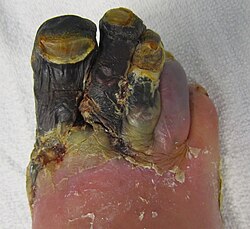Gangrene

Editor-In-Chief: Prab R Tumpati, MD
Obesity, Sleep & Internal medicine
Founder, WikiMD Wellnesspedia &
W8MD's medical weight loss NYC, sleep center NYC
Philadelphia medical weight loss and Philadelphia sleep clinics
| Gangrene | |
|---|---|

| |
| Synonyms | Gangrenous necrosis |
| Pronounce | N/A |
| Specialty | N/A |
| Symptoms | Discoloration, foul-smelling discharge, numbness, pain |
| Complications | Sepsis, amputation |
| Onset | Sudden or gradual |
| Duration | Varies |
| Types | N/A |
| Causes | Infection, ischemia, diabetes, smoking, trauma |
| Risks | Diabetes mellitus, peripheral artery disease, smoking, immunosuppression |
| Diagnosis | Physical examination, imaging studies, blood tests |
| Differential diagnosis | Cellulitis, necrotizing fasciitis, chronic ulcer |
| Prevention | Proper wound care, control of diabetes, smoking cessation |
| Treatment | Surgical debridement, antibiotics, hyperbaric oxygen therapy, vascular surgery |
| Medication | N/A |
| Prognosis | Variable, depends on severity and treatment |
| Frequency | Common in certain populations |
| Deaths | N/A |
Gangrene is a medical condition characterized by the death of body tissue due to a lack of blood supply. It can be caused by injury, infection, or underlying medical conditions such as diabetes or peripheral artery disease. Gangrene can affect any part of the body, but it most commonly occurs in the extremities, such as fingers, toes, hands, and feet.
Symptoms[edit]
Symptoms of gangrene include:
- Discoloration of the affected area (black, blue, green, or red)
- Pain in the affected area
- Foul-smelling discharge from the affected area
- Numbness or loss of sensation
- Coldness in the affected area
- In severe cases, tissue death
Causes[edit]
Gangrene occurs when the blood supply to a certain area of the body is interrupted or severely reduced. This can result from:
- Injuries, such as burns, frostbite, or crushing injuries
- Infections, especially those caused by bacteria, which can damage blood vessels and limit blood flow
- Underlying medical conditions, such as diabetes or peripheral artery disease, which can lead to poor circulation and increased risk of infection
Diagnosis[edit]
Diagnosing gangrene typically involves a physical examination, during which a healthcare professional will look for the characteristic signs and symptoms. Additional diagnostic tests may include:
- Imaging studies, such as X-rays, MRI, or CT scans, to assess the extent of tissue damage and identify any underlying causes
- Blood tests to check for infection or other contributing factors
- Tissue samples to identify the specific type of bacteria causing the infection, if applicable
Treatment[edit]
Treatment for gangrene depends on the severity of the condition and the underlying cause. Treatment options may include:
- Antibiotics to treat any bacterial infections
- Surgical debridement, which involves removing dead or infected tissue to promote healing
- Hyperbaric oxygen therapy, which involves breathing pure oxygen in a pressurized room to increase the amount of oxygen in the blood and promote healing
- Amputation, in severe cases where the gangrene has spread and cannot be controlled through other means
- Addressing any underlying conditions, such as managing diabetes or treating peripheral artery disease, to reduce the risk of future episodes of gangrene.
|
|
|
| Ischaemia and infarction | ||||
|---|---|---|---|---|
|
| Pathology | ||||||
|---|---|---|---|---|---|---|
|
Ad. Transform your life with W8MD's Budget GLP-1 injections from $49.99


W8MD offers a medical weight loss program to lose weight in Philadelphia. Our physician-supervised medical weight loss provides:
- Weight loss injections in NYC (generic and brand names):
- Zepbound / Mounjaro, Wegovy / Ozempic, Saxenda
- Most insurances accepted or discounted self-pay rates. We will obtain insurance prior authorizations if needed.
- Generic GLP1 weight loss injections from $49.99 for the starting dose of Semaglutide and $65.00 for Tirzepatide.
- Also offer prescription weight loss medications including Phentermine, Qsymia, Diethylpropion, Contrave etc.
NYC weight loss doctor appointmentsNYC weight loss doctor appointments
Start your NYC weight loss journey today at our NYC medical weight loss and Philadelphia medical weight loss clinics.
- Call 718-946-5500 to lose weight in NYC or for medical weight loss in Philadelphia 215-676-2334.
- Tags:NYC medical weight loss, Philadelphia lose weight Zepbound NYC, Budget GLP1 weight loss injections, Wegovy Philadelphia, Wegovy NYC, Philadelphia medical weight loss, Brookly weight loss and Wegovy NYC
|
WikiMD's Wellness Encyclopedia |
| Let Food Be Thy Medicine Medicine Thy Food - Hippocrates |
Medical Disclaimer: WikiMD is not a substitute for professional medical advice. The information on WikiMD is provided as an information resource only, may be incorrect, outdated or misleading, and is not to be used or relied on for any diagnostic or treatment purposes. Please consult your health care provider before making any healthcare decisions or for guidance about a specific medical condition. WikiMD expressly disclaims responsibility, and shall have no liability, for any damages, loss, injury, or liability whatsoever suffered as a result of your reliance on the information contained in this site. By visiting this site you agree to the foregoing terms and conditions, which may from time to time be changed or supplemented by WikiMD. If you do not agree to the foregoing terms and conditions, you should not enter or use this site. See full disclaimer.
Credits:Most images are courtesy of Wikimedia commons, and templates, categories Wikipedia, licensed under CC BY SA or similar.
Translate this page: - East Asian
中文,
日本,
한국어,
South Asian
हिन्दी,
தமிழ்,
తెలుగు,
Urdu,
ಕನ್ನಡ,
Southeast Asian
Indonesian,
Vietnamese,
Thai,
မြန်မာဘာသာ,
বাংলা
European
español,
Deutsch,
français,
Greek,
português do Brasil,
polski,
română,
русский,
Nederlands,
norsk,
svenska,
suomi,
Italian
Middle Eastern & African
عربى,
Turkish,
Persian,
Hebrew,
Afrikaans,
isiZulu,
Kiswahili,
Other
Bulgarian,
Hungarian,
Czech,
Swedish,
മലയാളം,
मराठी,
ਪੰਜਾਬੀ,
ગુજરાતી,
Portuguese,
Ukrainian


